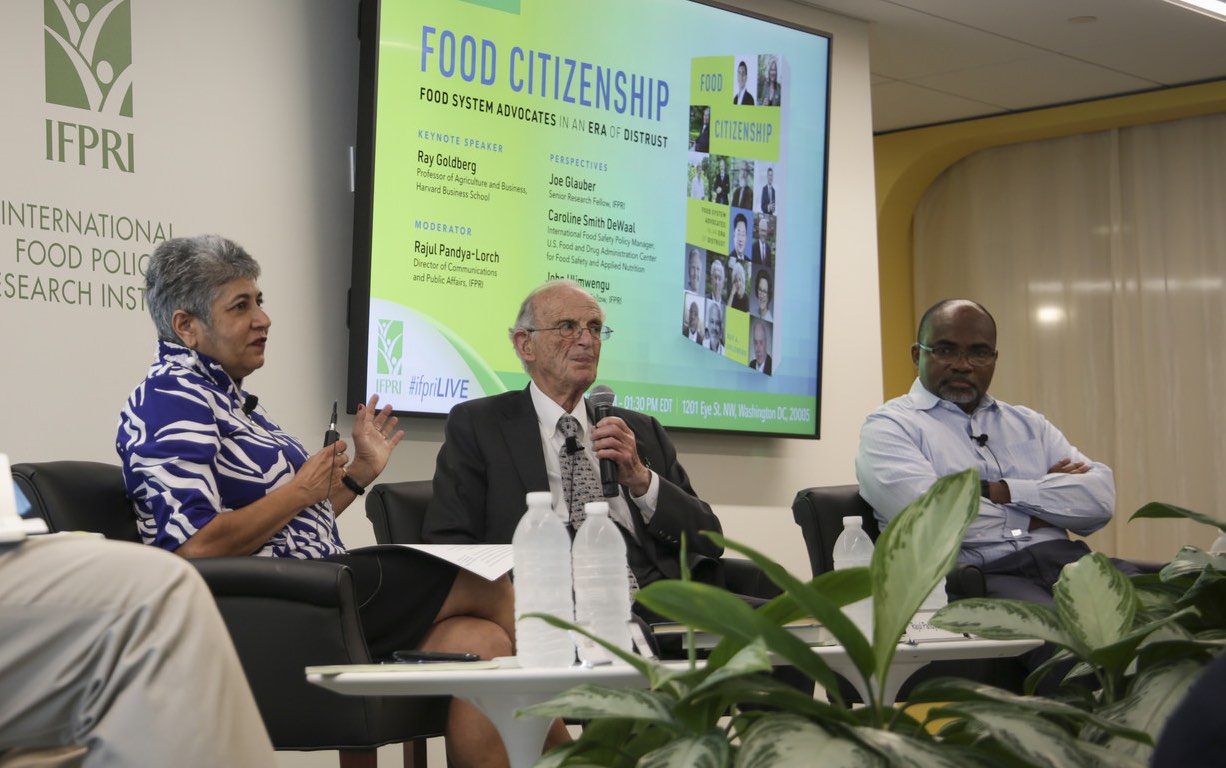The global food system is the largest single sector of the world economy, and it depends increasingly on leadership and collaboration focused on socially responsible management. That is the message of Harvard Business School Professor Ray Goldberg’s new book, Food Citizenship: Food System Advocates in an Era of Distrust. Goldberg sat down for an interview with IFPRI Director of Communications and Public Affairs Rajul Pandya-Lorch and panel discussion on Oct. 1.
The book is a compilation of interviews with change-makers in today’s food system. Goldberg said he wrote it to help people understand who makes decisions about food and how the global food system is changing. Increasingly, it revolves around collaborations between people with differing priorities and ways of attacking problems, working to improve nutrition and economic development.
The global food system offers an important opportunity to examine how the private, public, and not for profit sectors are working together to address extreme poverty and malnutrition, Goldberg said, and is thus the starting point for building better societies.
The food system also faces problems growing out of its own complexities, he said. Today, for example, many consumers are wary of the food they buy because they often don’t know what’s in it, and mistrustful of science in general. “Science has to spend as much time on the safety of new inventions and discoveries as they do on the science itself,” Goldberg said. The food system is the largest economic system in the world, Goldberg said, noting that consumer skepticism around its organization, environmental impact, and the production and nutritional value of the food it delivers is necessary.
Panelists Joe Glauber, an IFPRI senior research fellow, and Caroline Smith DeWaal, international food safety policy manager at the U.S. Food and Drug Administration, praised the Private and Public, Scientific, Academic, and Consumer Food Policy Group (PAPSAC) group convened by Goldberg since 1993, which is aimed at broadening communication between the various actors of the food system. “He always brings consumers in; he brings farmers in; and we are also talking about technology and corporate responsibility … he makes us within our minds deconstruct what we are looking at and then put it back together,” DeWaal said.
Panelist John Ulimwengu, an IFPRI senior research fellow, said that future progress depends on creating more multi-disciplinary platforms like PAPSAC that bring together small and big farmers and other players, regardless of scale.
Another of the book’s lessons is that governments must think about food and farming in systems terms, Ulimwengu said. “Agriculture-led development is not the sole responsibility of the Ministry of Agriculture,” he said. “It has to be the whole government’s business.”
Asked how individuals can make the biggest difference and drive positive change, Goldberg said that people’s increasing demands of their local governments, authorities, and schools for improved nutrition is leading to positive outcomes and growing understanding in the medical community, for example, that nutrition is more important than “popping pills.”
“I see a change in people moving from a transactional view moving up and down the food system to a collaboration,” said Goldberg. “I believe millennials will change our food system more than any other particular group of people in our history … I’ve never seen a brighter, more caring group of people from all over the globe.”
Katarlah Taylor is an IFPRI Senior Events Specialist.







